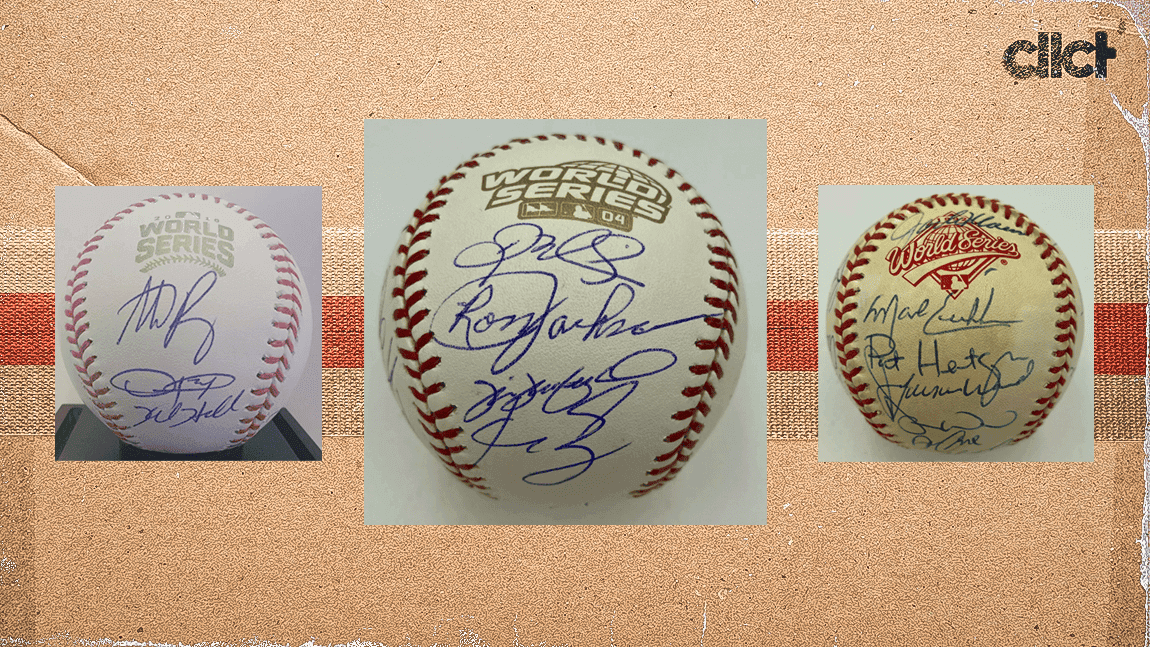Moments after the Dodgers clinched the 2024 World Series title Wednesday night, Fanatics began selling a "2024 Los Angeles Dodgers signed baseball" for $2,999.99.
The caveat? It only guarantees seven signatures and a limited edition of 100 total signed.
For what it's worth, the autographs are significant. The ball is signed by World Series MVP Freddie Freeman, Mookie Betts, Game 2 winning pitcher Yoshinobu Yamamoto, NLCS MVP Tommy Edman and Teoscar Hernandez, who played a major role in the Game 2 and 5 wins.
"The goal for us is to get as many significant players as we can at a price point that makes sense," Fanatics executive vice president Victor Shaffer said.
Shohei Ohtani, who is signed to Fanatics, is in an entirely different price bracket, and Shaffer said the company hopes to soon offer autographed Ohtani items from the World Series.
Fanatics also is selling a single-signed World Series ball from Yamamoto for $549, a Betts-signed ball for $699 and a Freeman-autographed ball for $999.
For years, the complete team-signed World Series baseball was a staple for collectors. Fans of the championship team saw them as must-have items, as did a small group of collectors of all team-signed World Series balls.
But things began changing as players' salaries started to rise.
"Back in the day, every player would sign," Shaffer said. "They needed a few bucks, some of them had jobs in the offseason. There was also loyalty. Player movement wasn't the same as it is today. So players felt more of a tie to signing with the team."
In 2006, Tri-Star's Bobby Mintz was waiting with hundreds of Cardinals championship items in the ballroom of the Hilton at the Ballpark in downtown St. Louis.
"We were an hour away from getting them all signed," Mintz told cllct, "and one of the players wanted too much. We just wouldn't have been able to do that deal. So, the team-signed items didn't happen."
Today, Mintz says stacks of unsigned 16x24 photos from the Cardinals' 2006 championship sit somewhere in Tri-Star's offices.
Money has been a major issue, partly because the World Series championship bump in autograph prices often leads to last-minute negotiations. The key players believe they have the leverage, because speed to market is so important.
In 2010, San Francisco Giants pitcher Tim Lincecum held out from a team-signed event. In 2011, Albert Pujols, who had recently signed a $300 million contract, wanted too much for a full team ball to make sense at retail for the public.
The 2016 World Series was an outlier as Fanatics was able to put together almost the entire Chicago Cubs team, minus pitcher Jake Arrieta. That's because Cubs fans were willing to pay $4,000 for a team-signed item after their team ended its 108-year title drought.
In 2017, Houston Astros star pitcher Justin Verlander told Tri-Star he had too much planned in the days and weeks after the World Series to do team-signed items. Mintz, whose company is based in Houston, wouldn't take no for an answer.
"We just couldn't have a World Series champs item without Verlander," Mintz said. "I told him that if we couldn't have him, his teammates wouldn't be able to do it either, and that changed his mind."
Tri-Star presold the team-signed items with Verlander and a month later, brought them in carry-on bags to Los Angeles, where Verlander completed the signing at his house.
"When we got back to Houston it was all hands on-deck because people needed the items for Christmas," Mintz said.
In 2013, Shaffer's Fanatics team started to get nervous about the Red Sox team-signed World Series items. They had to fly to the Virgin Islands with all the items to get Xander Bogaerts as the final signature.
Timing is another reason why a full-team signing is so difficult. The signings often happen right after the championship parade, and some players, because of the long season, bolt right away.
"We had two guys whose wives were pregnant, who couldn't do anything about it," Mintz said. "Then you have guys who want you to travel. It just depends how important they are and where they want to sign them because you have to bring the items."
In 2024, the Dodgers team-signed baseball available at retail is down to seven guys. What "team-autographed" items will be around, if any, a decade from now?
Darren Rovell is the founder of cllct.com and one of the country's leading reporters on the collectible market. He previously worked for ESPN, CNBC and The Action Network.

